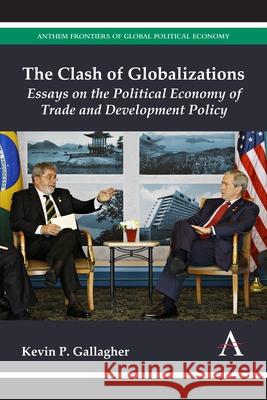The Clash of Globalizations: Essays on the Political Economy of Trade and Development Policy » książka
The Clash of Globalizations: Essays on the Political Economy of Trade and Development Policy
ISBN-13: 9781783083428 / Angielski / Miękka / 2014 / 184 str.
The Clash of Globalizations: Essays on the Political Economy of Trade and Development Policy
ISBN-13: 9781783083428 / Angielski / Miękka / 2014 / 184 str.
(netto: 122,25 VAT: 5%)
Najniższa cena z 30 dni: 127,05
ok. 30 dni roboczych.
Darmowa dostawa!
Bringing together a series of essays on the political economy of trade and development policy, this book explores the following research questions: to what extent is the global trading regime reducing the ability of nation-states to pursue policies for financial stability and economic growth; and what political factors explain such changes in policy space over time, across different types of trade treaties, and across nations? Gallagher presents intriguing findings on the policy constraints on the Uruguay Round, as well as the restrictions that the USA places upon the ability of developing nations to deploy a range of development strategies for stability and growth. Analyzing the factors which have led to twenty-first-century trade politics being characterized by a clash of globalizations, including the standstill of the World Trade Organization over the issue of development strategies in emerging markets, the book sheds light upon the growing opinion among developing nations that it is in their interest to build upon their current advantage in primary commodities and light manufacturing, and to expand into new, value-added intensive areas where they might, someday, have a comparative advantage. As this collection of essays demonstrates, developing nations now have, for the first time, the economic and political power to refuse the proposals of industrialized countries and to put forward an alternative set of negotiating demands that industrialized nations have to take seriously. This volume exposes the reality that economic power isn t the only factor in the difference between recent talks at the Doha Round and previous discussions; however, economic power is still key among a number of converging components, which, along with institutional structure, domestic politics, currency fluctuations and ideas about globalization, are effecting changes to global trade policies."
Collecting and synthesizing a series of essays on the political economy of trade and development policy, this book explores the following research questions: to what extent is the global trading regime reducing the ability of nation-states to pursue policies for financial stability and economic growth; and what political factors explain such changes in policy space over time, across different types of trade treaties and across nations? Gallagher presents intriguing findings on the policy constraints on the Uruguay Round, as well as the significant restrictions that the USA places upon the ability of developing nations to deploy a range of development strategies for stability and growth. Analyzing the factors that have led to twenty-first-century trade politics being characterized by a "clash of globalizations," this volume explores the role of economic power, institutional structure, domestic politics, currency fluctuations and ideas about globalization in effecting changes to global trade policies.











